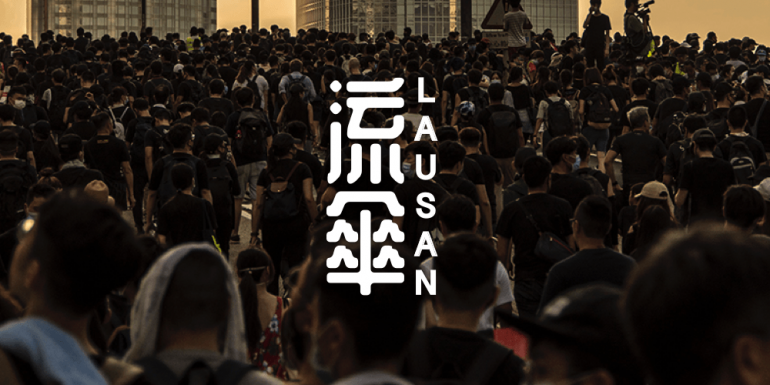Editors Note: This reflection was originally written in December 2019.
In late October, Lausan Collective organized a webinar to think through questions around transnational solidarity with the Hong Kong movement. The event brought together activists, students, and scholars from Hong Kong, Australia, Canada, the United States, and Mainland China. Our goal was to reject mainstream portrayals of the movement as a conflict driven by innate-“ideological” and ethno-cultural camps, and instead discuss the possibilities—and urgent need—for solidarity between Hong Kongers, Mainland Chinese, and people around the world facing similar forms of oppression and exploitation.
The webinar began with remarks from Hong Kong activists Au Loong-Yu and Ailing. Concerned about the movement’s sustainability in the face of increasingly brutal state violence, Au Loong-Yu emphasized the need to shift from incessant clashes with the police to broader labor and grassroots organizing. He advised it would be “critical for the protesters to consolidate themselves at a community level” by building coalitions with unions and progressive parties, transforming the movement from Hong Kong’s “last battle” to a “protracted battle.” Ailing suggested that leftists and progressives should turn their attention to the (then-upcoming) local district council elections and to build electoral power.
The discussion pivoted to geopolitics. JS, a Lausan member living in Boston, raised concerns about the portrayal of the Hong Kong protests as a clash between Western freedom and Chinese authoritarianism, and warned that simplistic binaries would only serve to bolster capitalist and state interests. “A starting point” to support the movement without falling for a “new Cold War” order, JS suggested, “is building a politics that simultaneously condemns Western hegemony,” while challenging China’s authoritarianism and state-capitalism.
Participants in the webinar spoke about the need to confront racism within Hong Kong and in overseas solidarity organizing. Both Au and Ailing addressed the need to extend solidarity to precarious Southeast Asian migrant workers in Hong Kong. Ailing also talked about pervasive racist sentiments toward Mainland Chinese and ethnic minorities, but highlighted the solidarity efforts at Chungking Mansion after the attack on Jimmy Sham, the leader of the League of Social Democrats, as an example and opportunity for building cross-ethnic solidarities.
Researcher Shan Windscript described efforts by Australia’s liberal, conservative and right-wing forces to revive an entrenched historical discourse of anti-Chinese racism, in the guise of supporting the Hong Kong protests. A Melbourne student activist, who attended several pro-Hong Kong rallies in her city, reported seeing “misogyny and racism on both sides,” and “opportunistic white men” telling Mainlanders to “go back to China.” A participant from Sydney who had helped organize Hong Kong solidarity events there pointed out that support of Hong Kong’s movement from Mainland Chinese immigrants has been ignored by the Australian media in favour of sensationalism and ethnic stereotyping. An activist from Vancouver observed similar dynamics in her city, pointing out how racism toward Mainlanders is on the rise amid “inter-imperialist rivalry between the US and China.” In the words of another Melbourne student activist, what we need is “an internationalist, anti-imperialist solidarity” that crosses borders.
Participants also pointed out that anti-racism—in Hong Kong and abroad—must also be anti-nationalist. One activist from Melbourne spoke about the need to refuse “racialized narratives of national identification” and the myth that nations are the natural foundation of identity and belonging. A participant from New York proposed a “worker-centric,” as opposed to a nation-centric, approach to uniting people, emphasizing the importance of unions and class struggle during political strife. A Melbourne-based writer and activist added that, in settler-colonial societies, building solidarity with Indigenous movements could provide an inclusionary politics to bring people together.
The webinar ended with a lively discussion about strategies for forming internationalist alliances in support of Hong Kong. One Chinese Mainland student based in US expressed interested in hosting events on campus to bring Chinese and Hong Kong international students into dialogue. Another graduate student in Australia of Chinese background had already started writing a book with a Hong Kong student to challenge pervasive ethnic stereotypes about Chinese and Hong Kong students in public discourse. Other participants also proposed writing and publishing articles, forming transnational reading groups, and reaching out to unions.
This brief webinar created new transnational connections. In its aftermath, participants have reached out to one another to organize local and international events. One Hong Kong-born student in Australia became encouraged to organize more with Mainland students after witnessing the solidarity on the call. One Mainland Chinese student became an organizer for his local Hong Kong solidarity forum, and a volunteer translator for Lausan.
We believe that the key to developing a truly democratic and emancipatory Hong Kong politics is to unite beyond borders. This political vision is driven not by an exclusionary logic of cultural differentiation, but by the principle of radical transnational solidarity. This means standing with oppressed people everywhere, and staying vigilant against all ethno-nationalisms. No matter its short-term expedience as a tool of political resistance, nationalism is inherently exclusionary and cannot be the basis for our true freedom.
The Hong Kong struggle presents the potential for a cosmopolitanism “from below.” But such politics depends on our ability to forge alliances with other grassroots movements around the world. As Hong Kong enters the new year, we ask you to join us in brainstorming new ways to organize locally and transnationally, and to support Hong Kong’s fight for democracy and liberation for all marginalized peoples in—and beyond—Hong Kong and China.



